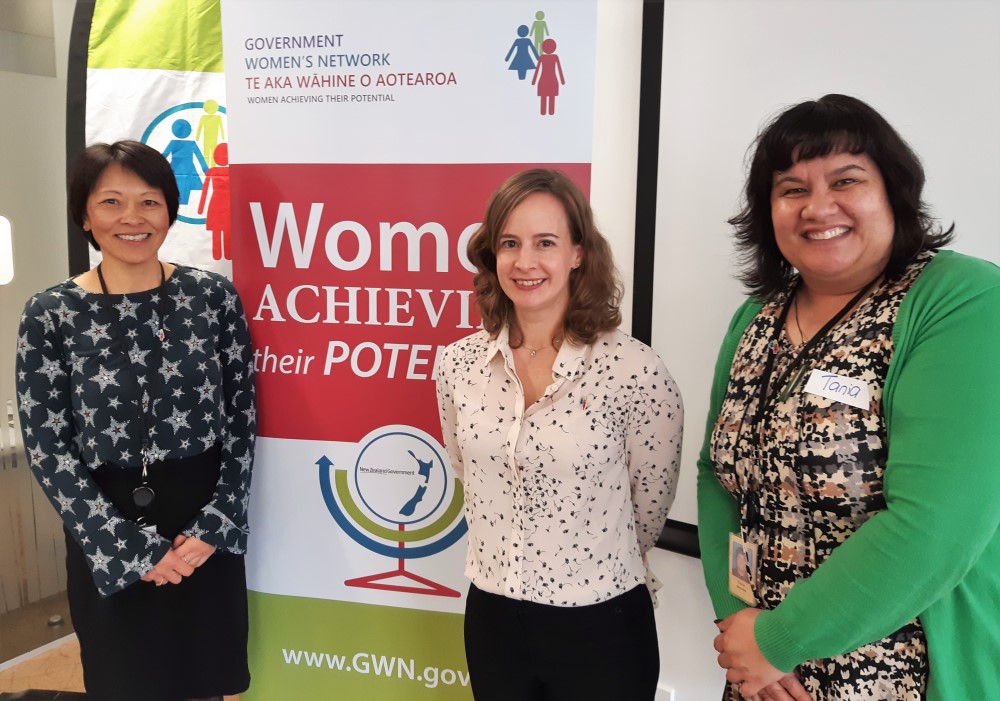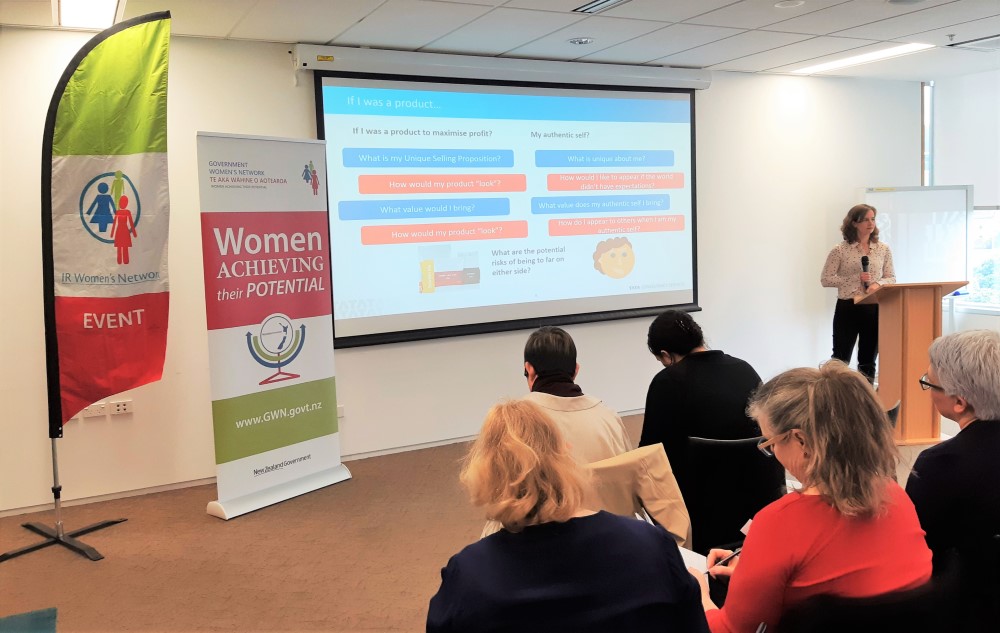Authentic you: building your personal brand
Inland Revenue's Women's Network and GWN hosted Jane Hodgen, Head of Inclusion, Diversity and Leadership Development at Tata Consultancy Services, to give a talk about how to build your personal brand on 15 October.
In her talk, Jane explained how personal brand is about taking your thoughts out of your subconscious and bringing them forward in your day-to-day work, and that a big part of knowing your brand is about being your authentic self.
Jane encouraged women not to resort to a stereotype of women 'doing the work behind the scenes', being stuck behind the computer while men put themselves out in the public eye. She urged women not to feel guilty for 'taking the space', owning the room and building connections.
The session was interactive with Jane offering exercises which challenged self-perceptions and encouraged self-examination to identify your truth, values, and priorities. She asked attendees to think about themselves as a product: how would you maximise 'profit'? how does your brand look and feel? what is your unique selling proposition?
In examining how to be our most authentic self, Jane suggested thinking about how internal and external expectations influence us. How would you like to appear to the world if these expectations didn't exist? What value would your authentic self bring?
The key to building your brand is finding the intersection between how you would promote yourself as a product and what your authentic self looks like and portraying that person to the world.




Key messages:
- Personal brand is about what it means to be yourself in the workplace.
- Don’t feel guilty about getting out there and talking to people, networking and connecting.
- Your value system can be thrown off by something as small as a person you’re working with or by your entire job or organisation. It’s important to understand your own value ystem so you can perform at your best.
- Identify your values and then figure out what they mean for what you need in your brand and for the kind of work you do.
- Find where ‘yourself as product’ and ‘your authentic self’ align.
- Be conscious of how you appear and how you’re percieved. Own your space; walk into a room with confidence; be visible.
- Identify the three things you want to change or introduce in your day-to-day life and practice them for at least 15 minutes each day.
Resources from Jane's talk:
Jane's powerpoint presentation
Digital Q+A session
We conducted a digital Q+A session as part of our post-event survey. You submitted these questions for Jane that were inspired by the event, and her responses are included below.
Can you recommend any good reading material/talks for simple steps to personal branding?
Read/listen widely and question what you read. Remember it always has to link back to who you are, your authentic self as well as how you want to be perceived by the world.
My absolute favourite go to is the podcast ‘Coaching for Leaders’ by Dave Stachowiak. Several elements in the talk were based on various podcasts from that series. I love podcasts because you can multitask – listening while running, doing the dishes, on the train/driving – whatever works in your schedule.
I mentioned Dr Lois Frankel in my talk as she has an interesting view and her books or videos are worth exploring. She makes you think a lot about success behaviours as they have been seen in a traditionally male dominant business world and tips for women to help us succeed in that environment. Whilst it might not be our ‘authentic’ self it is good to understand the impact of our behaviour on the perceptions and impressions others are forming.
If you haven’t seen it already, Amy Cuddy’s TED Talk is well worth watching (specifically on personal brand). Ann Bastianelli's TED Talk is also very good.
There is also a lot of material on the internet about online/social media personal branding if this is something you want to learn more about.
Does my authentic self maximise profit? It all depends on how you define profit. But if you are looking at it from a commercial perspective, I have to say no as I see my value-add as being intrinsic and adding to community wellbeing – now and in the long run. Jane's comment please.
I purposely chose to say ‘for profit’ as – at least talking for myself – I agree with you. I measure my worth in the contribution to others not monetarily. But I am very aware that a lot of the work world measures value in saving or making money.
So this exercise was to challenge and bring out different thoughts around the value you add and therefore the brand ‘YOU’ that you want to be visible. ‘What is the value I bring that would create financial value’ (like a commercial product would)? ‘What is the value I bring that would add some other kind of value?’ ‘What is the personal experience or value people feel when they interact with me?’ and ‘What do I think is my really authentic self regardless of whether I bring value or not?’
Taking yourself on that mental journey will start to build a picture of what you do and don’t want to have as your personal brand.
What are different ways of developing your personal brand, building on your personal values?
Developing your personal brand is about consistency in experience. Like with your favourite snack bar (or any product), we go to it because we know what to expect and we appreciate what we experience. In building your personal brand you are building yourself in others minds so they know what to expect, understand the value you bring and have trust in the experience they will have working with you. This requires constant self-reflection and checking in with yourself.
In building your personal values, the first step is to understand what your personal values are. The second is to use it to make decisions in day-to-day life. This means ‘doing the right thing for the right reason’ as you see it. The third is to actively seek out what will support your values – it could be additional volunteering, or mentoring or it could mean finding the role or job or organisation that aligns with those values.
Women from minority groups, are often called 'angry' when we are direct and this is often met with hostility especially from white older men. How do you think we could best deal with this?
Each situation and individual may be different and it has to be genuine to you the way you respond. I have seen this happen across various different cultures and minority groups. I have learnt from being a minority in many situations be it culture (and language), gender, age you often have to make that extra effort to gain trust to then be listened to.
This often isn’t want we want to do because it is hard not to feel judged and angry about being judged. I often use the approach of making sure I do relationship building with everyone and add in niceties before and after my very direct comments. Things can quickly spiral downward when there is hostility, trying to get your point across so that it is win-win really helps.
I have for the last month been watching just such a situation with a senior woman who feels she is not respected because she is from a different culture to the majority and she is very direct. She feels the men who are direct are not distanced in the same way she is. Her strategy seems to have been to be even more direct in an attempt to prove her knowledge and control on the situation. Unfortunately it hasn’t worked. The people who should be supporting her are withdrawing as they struggle to deal with her approach.
This has taught me many lessons about how the perception we have about how we are perceived and our natural reaction don’t always work in our favour. If she had instead reached out more, shown more vulnerability, worked more to understand the people she felt were judging her she may have better gained their trust and been in a position where people sought her advice and guidance more proactively.
I have been told by my manager and colleagues that they have no issues with me in person but I come across too direct and sometimes harsh in my email correspondence. I don't always realise when I am doing it. What would be a good way to work on this?
I am completely with you on that! Especially if you are strongly task-focused and pushed for time, it can tend to happen without you realising it. I normally write the email the way it comes out naturally and then before sending it go back and make sure I remembered all of the right greetings, (i.e. ‘how are you?) and anything else that can help build relationships. When you are stressed it is even more important to do that.
How has thinking about and working on her own brand assisted her with her career?
I tend to do a check in on my personal brand each year, as I do believe it can change.
In my early career I was doing well at a young age and so to be taken seriously I was very conscious of how I interacted, was visible, how I could be very genuine to myself as well as live up to expectation. I have been promoted regularly, given the roles I wanted, in the locations I wanted and been recognised both internally and externally for the work I have done. For which I am extremely grateful.
Particularly moving into the phase of being a parent with small kids, I would say for a while I lost focus and this certainly had a negative impact on how I felt about my career and I am sure, in turn, the value I could bring to others. This did affect me and my career – for the first time being looked over for a role I really wanted. I learnt a good lesson for that, which is that I can’t blame others for it, I can only look at myself for answers and what I am willing to put in to continuously move forward.
For me, now, it is about daily conscious actions to keep my personal brand alive which links to the experience people have interacting and working with me. Constantly asking ‘what do I want to be remembered for having achieved’. I realise that not only helps my personal brand, but also helps me stay motivated through those moments I am sure most of us have when everything feels more challenging than you think it should.
What is your message for women that want to lead successful careers?
Be conscious in everything you do. Actively practice the behaviours that will help you both be authentic to yourself and also help you with your career goals. It is so important to make sure you don’t get trapped in ‘being busy’ and ‘getting things done’, take the time out to step back, reflect on what your value really is.
Connect with people, understand their drivers and build your network. With this you will find taking the next step in your career a lot easier. The perception you have of yourself as well as the perception others have of you will be much more positive.